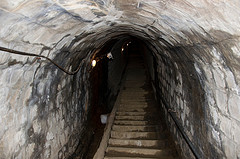Cutting the Costs of Bureaucracy: Are We Nearly There Yet and How Would We Know?
In 1955 G.A. Campbell wrote ‘[s]o long as officials obtained the whole or part of their income from fees, the total cost of the Service remained hidden. Parliament needed to provide no money at all for salaries in some departments, and where revenue did not balance expenditure it voted only for the difference. Under the new arrangements [after 1837] Parliament saw for the first time the wages bill of the public administration. The cost seemed to members of both Houses to be enormous. […] There has never since been a time when Parliament has not thought the Civil Service to be too costly and sought, more or less urgently, for economies in administration.’ (The Civil Service in Britain, Penguin, p. …
The Rise of the Failed Middle Income State
Last week, Foreign Policy and the Fund for Peace released their annual ranking of the world’s failed states. The list is based on indicators of 12 different measures of state failure, ranging across social, economic, political, and military factors. This year 34 countries fall into the “Alert” category, denoting those in the worst shape. Somalia and DRC lead the way; the bottom five countries are all in sub-Saharan Africa. What I think is most interesting about this year’s list is the fact that 12 of the “Alert” states – over a third – are middle-income countries. This is a new high, and indeed the emergence of failed middle income states is a relatively new phenomenon; back in 2006 there were only …
From Austerity to Growth – The politics of painfully slow economic recoveries
Much to Angela Merkel’s chagrin, international political momentum seems to have swung rather decidedly from ‘austerity’ to ‘growth’. The transformation had been underway for some time – playing out in debates across the economics blogosphere – but the elections in France and Greece clearly accelerated this evolution. The recent G8 summit communiqué – which leads with the phrase “Our imperative is to promote growth and jobs” – epitomizes the shift. In terms of our collective understanding of economics and how to fight recessions, I think there’s actually a lot less here than meets the eye, and indeed a lot of rather meaningless talk. To begin with, as Tyler Cowen has pointed out, ‘austerity’ means many different things to different people, and …
Political-Economic Roots of Haggling in Dakar
I was recently traveling in Dakar, Senegal. I was there visiting an American friend, I will call her A, who has been teaching English language at a local high school for three years. One evening we were hailing a taxi across town, accompanied by a friend of A who is also an American and a high school teacher in the city; I will call her B. My friend negotiated the price of the taxi prior to our taking a seat, as is the custom in Senegal. The taxi man insisted that the price was 2,500 CFA (500 CFA: $1US: £0.62BPS) and A insisted that we pay 2,000 CFA, the price that the Senegalese routinely pay to get across town. The …

Can the courts save Romania from selling its state owned industry on the cheap?
Shortly after my post on Romania’s paradox of plenty, the recently appointed Romanian Prime Minister came out with another mind-boggling announcement: the government had secretly sold Cupru Min, Romania’s largest copper mine, possessing over 60 percent of the country’s copper resources, to Roman Copper Corp., a Canadian Company, for a mere $200m (US). Quite pleased with the deal, the Prime Minister emphasised that the copper mine had been a black hole for the government, which it finally managed to sell for four times its value. These are misleading overstatements. While the precise value of Cupru Min is unclear, its worth is estimated to be between $6b and $14b (US), whilst the agreed profit sharing deal with Roman Copper only gives …

Rawls on Wall Street: comparing his theory of justice to economic liberal theory
In terms of the financial crisis, there are fascinating links between the Rawlsian theory of justice and the economic liberal theory which has drawn criticsm for failing to predict the crash. For Rawlsian adepts: this is not an attempt to apply Rawls’ theory of justice to explain the current economic crisis. It would not be suited to do so and neither was it designed to do so. But highlighting these links may teach us a thing or two about both endeavours and also give us pause about the Rawlsian project itself. Much (too much?) has been written about Rawls, both in defense of his project and against it. Those in disagreement generally use one of two strategies: attack the …

Boiling over – Spain’s economy needs bold leadership
The scope and scale of the Eurozone crisis has led many to forget that different countries had very different economies when the crisis erupted. In an attempt to arrive at general conclusions about the malaise affecting the economies of the EU we have failed to understand the particularities of each case. The most common of these generalisations is that high levels of public debt in the EU periphery are the overall cause of the Union’s problems. Current debates about the economic situation in Spain, for example, are centred on the country’s need to reduce its budget deficit to 5.3% of GDP, as agreed this year with European partners in Brussels. Just recently, the newly elected Spanish conservative government succeeded in …

Romania’s Rosia Montana Mining Project: another example of the policy pitfalls of resource extraction
On January 28, a freezing day in Bucharest, hundreds of Romanian citizens protested against a government-approved gold mining project in Rosia Montana by a Canadian corporation, Gabriel Resources Ltd. It was not the first protest against the project: as I mentioned in a previous post, anti-governmental sentiment has swept the country since mid-January, and the row over Rosia Montana is a key issue. But despite the protesters’ warnings about the environmental, cultural and economic consequences of the project, Romanian authorities seem disinterested. The project’s opponents criticise the use of cyanide (a common technique used to leach gold from extracted material) which would have a devastating and irreversible impact on the region’s biodiversity. Moreover, the mine would lead to the destruction of over …









